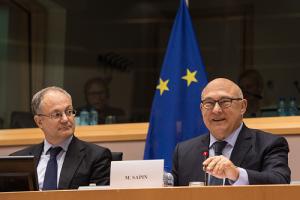Finance & Economics
Growing and Deleveraging: the Conflicting Challenge of Central, Eastern, and Southeastern European Countries
Growth patterns are increasingly divergent in Central, Eastern, and Southeastern Europe (CESEE), says a new report by the International Monetary Fund (IMF). The group of countries stretching from the Baltic states all the way to Turkey have been affected differently by external forces - oil prices, strength of the euro area recovery, and geopolitical tensions.
- Read more
- 287 reads
Unleash innovation to spur growth in Europe
Improving Europe's capacity to innovate and be globally competitive requires further efforts to encourage disruptive ideas and foster their commercial up-take. These are some of the conclusions to be drawn from the latest ranking of innovation performance across Europe.
- Read more
- 323 reads
IMF Technical Assistance Moves to Strengthen the Capacity of Officials in South East Asia on Macro-Financial Linkages and Diagnostics
The International Monetary Fund (IMF)’s Technical Assistance Office for Lao P.D.R. and Myanmar (TAOLAM) in cooperation with the IMF’s Singapore Regional Training Institute (STI) organized a workshop from May 5-6 in Bangkok, Thailand, to help officials from Cambodia, Lao P.D.R, Myanmar and Vietnam build capacity in the areas of macro-financial linkages and diagnostics.
- Read more
- 292 reads
Aviation in Vanuatu Receives Critical Upgrade
The World Bank’s Board of Executive Directors approved a credit of US$59.5 million to improve the safety and efficiency of Vanuatu’s aviation sector – a critical pillar in Vanuatu’s continued social and economic development, and a key part of its disaster management and recovery activities on May 8.
- Read more
- 390 reads
Tanzania’s Strong Economic Growth Shows Signs of Trickling Down
Sustained rapid economic growth and concerted efforts around national strategies to alleviate poverty have led to a decline of approximately one percentage point per year in the rate of poverty in the country between 2007 and 2012, constituting the first significant reduction in 20 years.
- Read more
- 362 reads
IMF Mission and Senegal Reach Staff-Level Agreement on the Program under the Policy Support Instrument
An International Monetary Fund (IMF) mission led by Ali Mansoor visited Senegal from April 24 to May 7, 2015 to conduct discussions with the Senegalese authorities on their economic program, which may be supported by a new three-year IMF arrangement under the Policy Support Instrument (PSI). Subject to IMF management approval, the staff-level agreement is expected to be submitted to the IMF Executive Board for its consideration in June 2015.
- Read more
- 325 reads
IMF Staff Completes Review Mission to Guinea
An IMF mission led by Abdoul Aziz Wane visited Conakry during April 23-May 8, 2015, to conduct discussions on the sixth review of the authorities program supported by an arrangement under the Extended Credit Facility (ECF), which was approved by the IMF Executive Board on February 24, 2012 for SDR 128.52 million. The mission met with finance minister Mohamed Diaré, central bank governor Lounceny Nabé, planning minister Sékou Traoré, deputy budget minister Ansoumane Condé, and other senior government officials, as well as the banking association. The discussions focused on recent economic developments, growth prospects, and policy implementation, as well as policies and structural reforms for 2015.
- Read more
- 277 reads
IMF Staff Completes the 2015 Discussions with the Central African Economic and Monetary Community on Common Policies for Member Countries
A team from the International Monetary Fund (IMF), led by Mario de Zamaróczy, visited Libreville and Yaoundé during April 23–May 7, 2015 and held discussions with the institutions of the Central African Economic and Monetary Community (CEMAC1) on common policies for member countries. Mr. Bernard Laurens, mission chief for the CEMAC Financial Sector Assessment Program, joined the mission to discuss financial sector reforms to promote stability and development.
- Read more
- 306 reads
French finance minister Michel Sapin rejects "clichés about France"

French Minister Michel SAPIN is at ECON Committee meeting
- Read more
- 270 reads
The cost of undeclared work: employment MEPs vote on new measures to tackle problem
Undeclared work lead to countries missing out on taxes and social security contributions as well as to distortions in the labour market as it gives people who don't declare their services and goods an unfair advantage. Far from being a minor issue, undeclared work amounted to 18.4% of the EU's GDP in 2012. On 7 May the employment committee votes on a proposal to launch a new European organisation to help member states work together on it.
- Read more
- 278 reads
Human Rights
Fostering a More Humane World: The 28th Eurasian Economic Summi

Conscience, Hope, and Action: Keys to Global Peace and Sustainability

Ringing FOWPAL’s Peace Bell for the World:Nobel Peace Prize Laureates’ Visions and Actions

Protecting the World’s Cultural Diversity for a Sustainable Future

Puppet Show I International Friendship Day 2020

